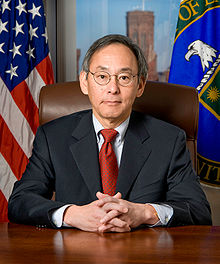
Back ستيفن تشو Arabic ستيفن تشو ARZ Steven Chu AST Stiven Çu Azerbaijani استیون چو AZB Стывен Чу Byelorussian Стивън Чу Bulgarian স্টিভেন চু Bengali/Bangla Steven Chu Catalan Steven Chu Czech
Steven Chu | |
|---|---|
 Official portrait, 2009 | |
| 12th United States Secretary of Energy | |
| In office January 21, 2009 – April 22, 2013 | |
| President | Barack Obama |
| Deputy | Daniel Poneman |
| Preceded by | Samuel Bodman |
| Succeeded by | Ernest Moniz |
| Personal details | |
| Born | February 28, 1948 St. Louis, Missouri, U.S. |
| Political party | Democratic[1][2] |
| Spouse(s) | Lisa Chu-Thielbar (divorced) Jean Fetter (m. 1997) |
| Children | 2 |
| Father | Ju-Chin Chu |
| Relatives |
|
| Education | University of Rochester (BA, BS) University of California, Berkeley (MS, PhD) |
| Occupation | Politician, writer |
| Profession | Physicist |
| Awards |
|
| Website | University website |
| Scientific career | |
| Fields | Atomic physics, biological physics, polymer physics |
| Institutions | |
| Thesis | Observation of the Forbidden Magnetic Dipole Transition 62P1/2→72P1/2 in Atomic Thallium (1976) |
| Doctoral advisor | Eugene D. Commins |
| Doctoral students | Michale Fee |
| Chinese name | |
| Chinese | 朱棣文 |
| Hanyu Pinyin | Zhū Dìwén |
Steven Chu (born February 28, 1948)[3] is an American physicist. He was the 12th United States Secretary of Energy from 2009 to 2013. Chu is known for his research at Bell Labs in cooling and trapping of atoms with laser light, which won him the Nobel Prize in Physics in 1997, along with his scientific colleagues Claude Cohen-Tannoudji and William Daniel Phillips.[3]
Chu is the first Nobel Prize winner and the second Chinese American to hold a post in the United States Cabinet.[4][5] Before becoming the United States Secretary of Energy, he was a professor of physics and molecular and cellular biology at the University of California, Berkeley. He was also the director of the Lawrence Berkeley National Laboratory.[6]
Before teaching at Berkeley, he was a professor of physics at Stanford University. He has argued for more research into alternative energy and nuclear power. He thinks the world should shift away from fossil fuels to help with climate change.[7][8][9] For example, he discusses a global "glucose economy". This is a form of a low-carbon economy, in which glucose from tropical plants is shipped around like oil is today.[10]
- ↑ Steven Chu's file. PolitiFact. Retrieved on 2012-02-04.
- ↑ "Fundraising activities are limited, but star power brings in the bucks". Archived from the original on 2012-02-15. Retrieved 2012-02-15.
- ↑ 3.0 3.1 Tore Frängsmyr, ed. (1998). "Steven Chu Autobiography". The Nobel Prizes 1997. Les Prix Nobel. Stockholm: The Nobel Foundation. Retrieved 2007-06-25.
- ↑ Jake Tapper (2008-12-11). "A Nobel Prize Winner in the Cabinet". ABC News. Retrieved 2009-03-23.
- ↑ Sky Canaves (2009-02-26). "Commerce Nominee a Locke In China". The Wall Street Journal. Retrieved 2009-03-23.
- ↑ "Dr. Steven Chu, Secretary of Energy". United States Department of Energy. Retrieved 2009-02-24.
- ↑ H. Josef Hebert (2008-12-08). "Energy secretary pick argues for new fuel sources". Associated Press. Retrieved 2010-11-09.
- ↑ Sarah Jane Tribble, 'Nuclear: Dark horse energy alternative,' Oakland Tribune, 2007-06-18. [1] Archived 2013-08-29 at the Wayback Machine
- ↑ Directors of DOE National Laboratories (August 2008). "A Sustainable Energy Future: The Essential Role of Nuclear Energy" (PDF). Department of Energy. Archived from the original (PDF) on 2008-12-30. Retrieved 2011-12-13.
- ↑ "A scientist who is on tap, on top". St. Petersberg Times. July 26, 2009. Archived from the original on January 24, 2010. Retrieved January 10, 2010.